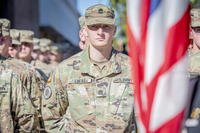Joe Plenzler is a retired Marine Corps combat veteran of Iraq and Afghanistan. He also served as the PAO to the 34th, 35th and 36th commandants of the Marine Corps.
"Hero" is a loaded word.
And since Sept. 11, 2001, the word "hero" has been frequently applied to members of the military, veterans and first responders.
We see evidence of this in our language -- the reflexive "thank you for your service."
We see it at large public events, such as ball games, and in smaller ways, like reserved veteran parking spots and store discounts.
We see it on public display during our national patriotic holidays.
Many in the military and veteran community are uncomfortable with the wide application of the word "hero," as heroism in the military context requires valor in the face of great physical or moral danger and persistence in the face of fear.
Our military culture recognizes heroes with personal decorations like the Medal of Honor. Our heroes are few and far between.
Because of this, many veterans are simultaneously thankful yet uncomfortable with being thanked for their service.
After 20 years of serving in uniform, I know these things to be true.
Veterans know what it's like to go to war and sacrifice for what we believe is right.
We know what it's like to be away from our families and friends for extended periods, and to bravely step forward to serve.
We know what it's like to enter the unknown and persist against adversity.
Although more than 1.6 million of us have deployed to the post-9/11 battlefields of Iraq, Afghanistan and elsewhere, most of us believe that we simply did what our nation asked us to do.
And many veterans who were decorated for heroism have told me that they are uncomfortable with individual public recognition and that their medals hang heavily on their chests or around their necks.
Some Medal of Honor recipients I know have given their decorations back to their combat units to honor fallen comrades and to symbolize that great acts on the battlefield are the result of their team's efforts.
But something interesting is happening in light of the COVID-19 pandemic: The public dialogue around the words "hero," "courage," "service" and "patriotism" is shifting.
We have seen new champions emerge to meet this global threat.
We have seen everyday people redefining and expanding our common conceptions of courage, patriotism and selfless service. These people have stepped into the unknown and risked their health to treat the ill, save lives, console survivors, and keep essential medical and food supplies moving.
We are witnessing this dynamic in the daily struggles of doctors, nurses, hospital workers, emergency medical technicians, pharmacists, farmworkers, truck drivers, grocery store clerks and many more.
It is good for our nation to thank and recognize them. Perhaps, when COVID-19 restrictions lift and we are again safe to come together in great numbers at public events, we ought to ask our COVID-19 responders to stand and be recognized?
This pandemic has revealed that what had often been considered to be everyday jobs are, in fact, essential elements of our civilization.
The truth is that it takes many people from many walks of life to make our society worth living in, and sometimes it takes a major threat to reveal what's essential to our continued health and happiness.
There are many lessons to be learned from the global tragedy unfolding around us, and we can find inspiration and hope in the actions of those who have stepped forward to meet this threat.
I encourage all veterans to seek out those who are protecting our society today and make a point of thanking them for their service.
All who are battling COVID-19 deserve our heartfelt thanks and admiration.
Most importantly, thank you for your service to our great nation.
-- The opinions expressed in this op-ed are those of the author and do not necessarily reflect the views of Military.com. If you would like to submit your own commentary, please send your article to opinions@military.com for consideration.
















